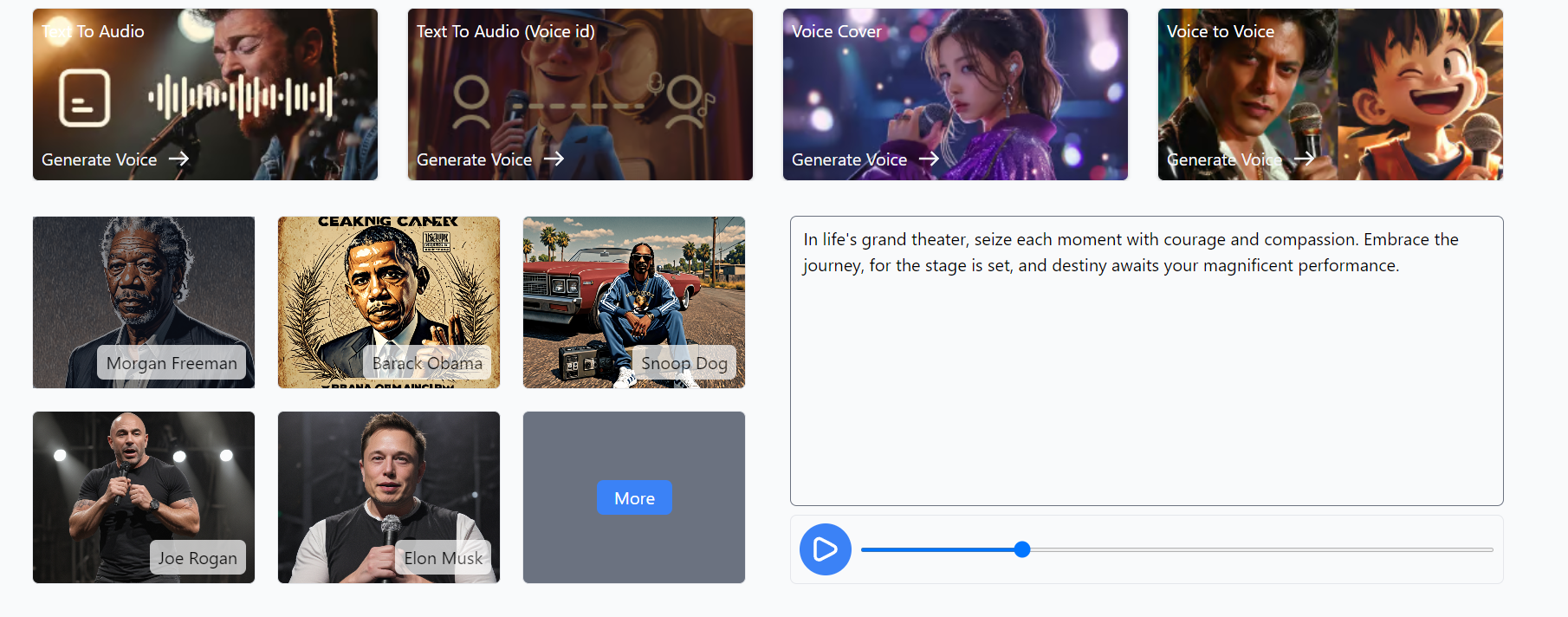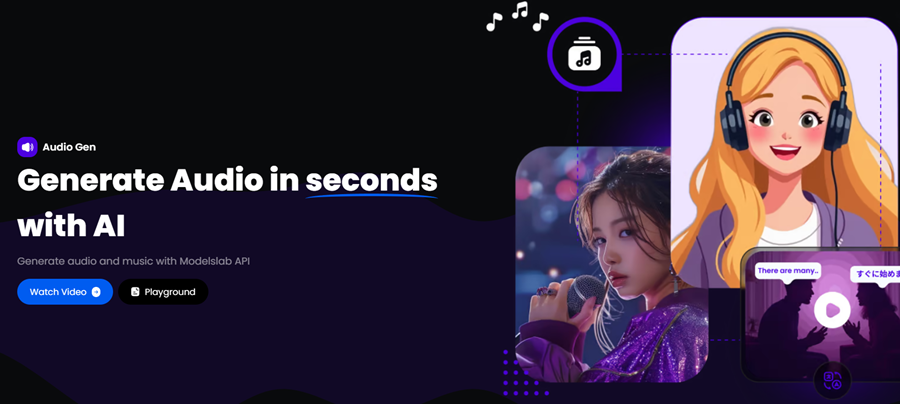How To Integrate AI Voices Into Your Video Game Development
Written on . Posted in AI.
As of March 2024, the global video games market was valued at $282.3 billion. The gaming industry is changing quickly, and various gaming experiences are having a huge impact on the market.
VR gaming and newly launched games with high-quality graphics, voices, and music are behind this growth. In recent years, many game developers have started using AI voices in game development.
In this blog, we’ll explain some of the exciting ways AI voices are being used in games today, from interactive NPCs to voice-guided tutorials. Whether you're a gamer interested in the tech, a developer adding features, or a company looking into future game design, this blog is for you.
What are AI Voices?
AI voices are synthetic voices created by artificial intelligence to sound like real human speech. These voices are used in a variety of applications, including virtual assistants, audiobooks, customer service, and video games.

By mimicking the natural sounds, tones, and rhythms of human speech, AI voices provide a realistic and interactive experience, making them especially popular in gaming and entertainment.
How Do AI Voices Work?
Data Collection and Training: AI voices are trained using large datasets of recorded human speech. These recordings include different accents, tones, and speaking styles to help the AI understand the variety of human speech patterns.
Machine Learning Models: Using machine learning, particularly deep learning models like neural networks, the AI learns to identify and replicate the details in human voices, such as pitch, intonation, and pronunciation.
Speech Synthesis and Voice Cloning: Once trained, AI voices can generate entirely new speech or mimic an existing voice. Through voice cloning, AI can produce a near-exact copy of a person’s voice from a short sample, capturing the unique pitch and style of the original speaker.
Text-to-Speech (TTS): The final step involves text-to-speech (TTS) technology, where users input text, and the AI voice "reads" the text aloud. This process makes AI voices dynamic, allowing them to respond to users in real time or be used to create character dialogue in games.
AI voices are customizable, bringing characters to life with realistic speech for an immersive experience across digital platforms.
Also Read: How to Generate High-Quality Audio with ModelsLab’s Text to Audio
How AI Voices Can Be Used in Game Development?
Here are some of the most interesting ways AI voices can be used:
1. Use in NPC Dialogue
AI voices allow non-playable characters (NPCs) to have natural, responsive conversations (by setting rules) with players. Using text-to-speech (TTS) and AI voice cloning, these conversations can adapt based on the player’s actions or in-game events.
Rather than recording thousands of lines, AI voice synthesis creates dialogue on-the-fly, based on set variables, allowing complex conversation paths without high recording costs.
2. Personalized Player Avatars
In some games, players can create avatars that actually speak, and AI allows them to choose or even train a custom voice for their character, adding a personal touch to the experience.

AI voices can also simulate responses from the player's perspective, especially in VR or AR games, where creating a realistic experience is important.
Also Read: Can AI Dubbing Translate Videos and Clone Voices Quickly?
3. Storytelling Using AI Voices
Games often change with updates and expansions, and AI voices let developers add or update voice lines without needing the original actors, ensuring a smooth experience. AI voices can also adjust the story based on the player's actions, making the game world feel more lively and interactive.
4. Create Script and Dialogues for NPCs
In games with large worlds, like RPGs or sandbox games, AI voices can create unique dialogues for random NPCs, adding variety without the need for custom scripts for each character.
They can also change NPC reactions and dialogue based on factors like weather, time of day, or the player's past actions. This will improve realism in games.
Try our LLMaster to create Script and Dialogues in few Minutes!
5. Language Localization and Accessibility
AI voice cloning makes it easier to translate games into different languages without hiring native speakers for every character, which helps both small and large game developers reach more players.
It also helps visually impaired players by providing spoken descriptions of the game's environments, actions, and menus, making the game more accessible to everyone.
6. Emotionally Adaptive AI Voice
AI voices can change their tone based on what the player does. For example, they can become serious after a dramatic scene or playful during a fun moment.
This helps create NPCs with deeper emotions that respond thoughtfully, making the story more engaging and relatable for players.

7. In-Game Tutorials and Guides
AI voices are perfect for creating in-game virtual assistants that offer tutorials, hints, or reminders based on what’s happening in the game.
They can analyze gameplay in real time to give tips that feel natural, improving the player experience without interrupting immersion.
8. Testing
AI voices can be made quickly while developers are still working on their games, so they can test how the dialogue sounds without hiring actors right away.
This lets them try out different tones and styles of speaking to see what works best for different players, helping them improve the story before the game is finished.
9. Marketing and Trailers
AI voices can be used in Game trailers and marketing materials to create unique voice overs or to let potential players interact with the game’s world and characters through dialogue choices.
These AI voices will provide a consistent sound for characters in promotional content, aligning them with the game’s story without the need for custom recording sessions.
Also Read: How to Convert Your eBook into an Engaging Audiobook Using ModelsLab
Benefits of Using AI Voices in Games
Here’s why integrating AI voices into your games is a great idea:
Normally, you'd need to hire voice actors and pay for a recording studio, which can be expensive. AI voice generators let you create realistic voices at a much lower cost.
You can generate AI voices in just a few minutes, eliminating the need to find and book voice actors or studios.
Your game can reach a global audience since many AI voice generators can produce voices in hundreds of languages and accents, making it easier to localize your game.
AI voices provide uniform pronunciation, tone, and delivery. You can assign a specific voice to each character and use it consistently throughout the game.
If you change the script, you can quickly update the AI voice without needing to record everything again.
Overall, using AI voices can save you time and money, simplify the development process, and enhance the experience for your players by bringing characters to life.
Steps for Using AI Voices in Games
Now that you know the benefits of AI voices, here’s a simple guide on how to implement them in your games:
Choose the Right AI Voice Solution
Take your time to select an AI voice tool that meets your needs. The quality of voice output is important, so don’t just pick any option randomly.
Consider Key Factors
When choosing an AI voice solution, keep these factors in mind:
Voice Quality: Look for high-quality, human-like voices that can convey your game characters' emotions effectively.
Customization: Choose a tool that allows you to adjust the speed, pitch, tone, and intonation for each character.
Language and Accent Support: Make sure the tool offers multilingual capabilities to reach a broader audience.
Pricing and Licensing: Review the costs and usage rights to find a solution that fits your budget.
Prepare Your Dialogue
Write clear and engaging dialogue for your characters, similar to crafting a script. Proofread and refine the lines to ensure they’re impactful and effective.
Decide Your Voice Parameters
Once you have the dialogue ready, fine-tune the voice settings:
Voice Type: Decide if your character is male, female, or a child, and specify traits like “wise old man” or “strong female.” You can clone the ideal voice, according to your need.
Language and Accent: Choose the appropriate language and accent for each character.
Pitch and Speed: Adjust these settings to match the character's personality or the situation in the game.
Emotions: Use emotional filters to improve the delivery based on the character’s needs.
Take your time experimenting with these parameters until you achieve the best results for each character.
Also Read: 10 Amazing Uses of AI Voice Generators in Marketing and Advertising
Generate the AI Voices
Now it's time to create the voices. Try our AudioGen to experiment with different voices.
Import the Dialogue Text: Upload or input your prepared dialogue.
Select Character Voices: Assign the AI voices to each character based on your earlier choices.
Generate Voiceovers: Start the generation process, turning your text into rich, natural-sounding voices.
Review and Edit: Listen carefully to the generated voices for any errors or poor quality. Make adjustments as needed.
Export and Integrate: Once you’re happy with the results, export the audio files and integrate them into your game engine.
And there you have it! You’ve transformed written dialogue into engaging AI character voiceovers without needing to hire voice actors or book recording studios.
Final Thoughts
AI voices are changing the gaming experience, allowing developers to create engaging and realistic characters efficiently. With benefits like cost savings and multilingual support, they are becoming important in game development.

Try Audiogen to easily generate high-quality voiceovers for your characters.
FAQs
1. How are AI voices used for NPC dialogue in games?
AI voices let NPCs (non-playable characters) talk naturally and respond to player actions, creating more interactive and engaging conversations without recording thousands of lines.
2. Can players customize their avatar’s voice with AI?
Yes, players can pick or even train a custom AI voice for their avatar, adding a personal touch to their character and making gameplay more immersive.
3. How do AI voices help with storytelling in games?
AI voices make it easy to update or add voice lines as games evolve. They adapt to player actions, making the story feel more alive and reactive.
4. Why are AI voices useful for testing games?
AI voices are quick to generate, so developers can test dialogue without hiring actors, allowing them to experiment and refine character voices early in development.
5: How can developers use AI voices in games, and how does AudioGen help?
Developers use AI voices to create realistic NPC dialogue, customize player voices, and use multiple languages. AudioGen API can help provide easy, high-quality AI voice generation, allowing developers to quickly create lifelike characters without recording every line.
